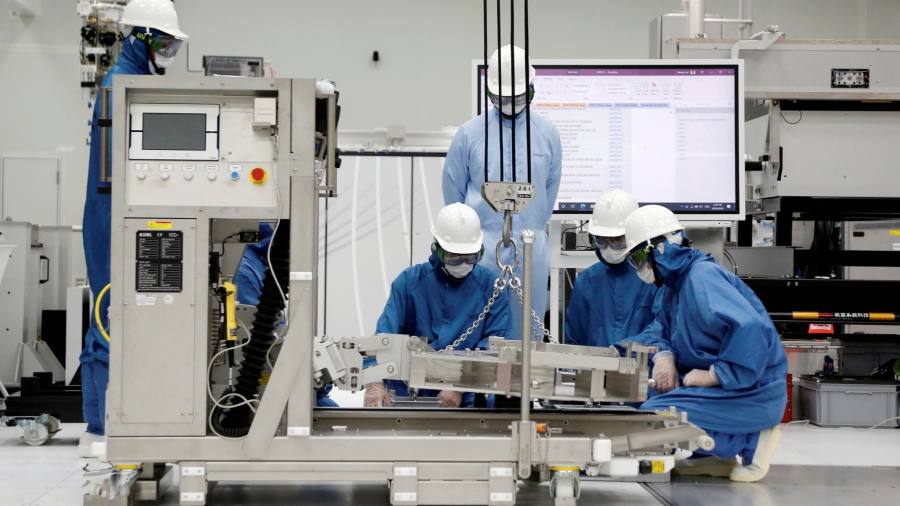Receive free Semiconductors updates
We’ll send you a myFT Daily Digest email rounding up the latest Semiconductors news every morning.
Dozens of ASML chipmaking machines destined for China will soon need a licence to be shipped after the Dutch government followed the US and Japan in imposing tough curbs on technology exports.
The Hague said that, from September 1, it will bar high-end chipmaking machines, which could be used for “advanced military applications”, from being exported abroad without such a permit.
The Dutch trade minister insisted the controls were “country neutral” but in practice exporters expect China will be one of the few countries that will not be covered with a licence.
“We have taken this step in the interest of our national security,” Liesje Schreinemacher said on Friday.
The US, Japan and the Netherlands are keen to form a united front in depriving China of the most advanced silicon chips. The move came after heavy US pressure and will primarily affect ASML, which makes the world’s most advanced semiconductor-making tools.
The controls are similar to those recently imposed by Japan, which included machines capable of producing chips of 45nm and below. Both countries had lengthy talks with the US and had agreed to take steps in January. Washington is seeking to curb China’s access to advanced weaponry as it threatens Taiwan and adopts a more assertive military stance.
ASML said the Dutch controls would cover its most advanced “immersion DUV lithography systems”, which use ultraviolet light.
Three of ASML’s four systems for immersion lithography will be captured by the new rules, leaving Chinese chipmakers unable to manufacture at commercial scale semiconductors smaller than 28nm. That scale leaves cutting-edge applications such as the latest processors for smartphones and artificial intelligence largely out of reach for Chinese manufacturers such as SMIC.
According to two people familiar with the situation, several dozen machines ordered by Chinese companies from ASML that had been scheduled for delivery over the coming years are now unlikely to be delivered.
ASML declined to comment on specific sales figures but said it did “not expect these measures to have a material impact on our financial outlook that we published for 2023 or for our longer-term scenarios as communicated during our investor day in November 2022”. Those scenarios were based on booming global demand, it added.
ASML’s most modern machines have been banned from China since 2019. China accounted for about 15 per cent of ASML sales in 2022.
“We have looked at this very carefully and have been as precise as possible,” said Schreinemacher. “This way we can address the most important vulnerabilities without unnecessarily disrupting the global production of chips.”
The announcement came while Dutch prime minister Mark Rutte attended a summit in Brussels discussing EU policy towards China, which has hardened in recent months. The 27 member states agreed to “de-risk” their exposure to China and build up alternative sources of critical raw materials, green technology and the like.
China’s foreign ministry spokesperson Mao Ning criticised the export controls on Friday, saying the restrictions impose “a technological blockade against China” and “seriously undermine market rules and the international trade order”.
China will stay close to relevant developments and “firmly defend our lawful rights and interests”, Mao said.
Janardan Menon, technology analyst at Jefferies, said the new rules were broadly in line with expectations following the Dutch government’s announcement of its plans for more controls in March.
Menon estimates that ASML ships fewer than 100 immersion systems globally each year, of which about 20 per cent have previously gone to China.
“Most Chinese companies have already converted all their orders” to the ASML machine that is still permitted to ship there, Menon said.
Read the full article here




